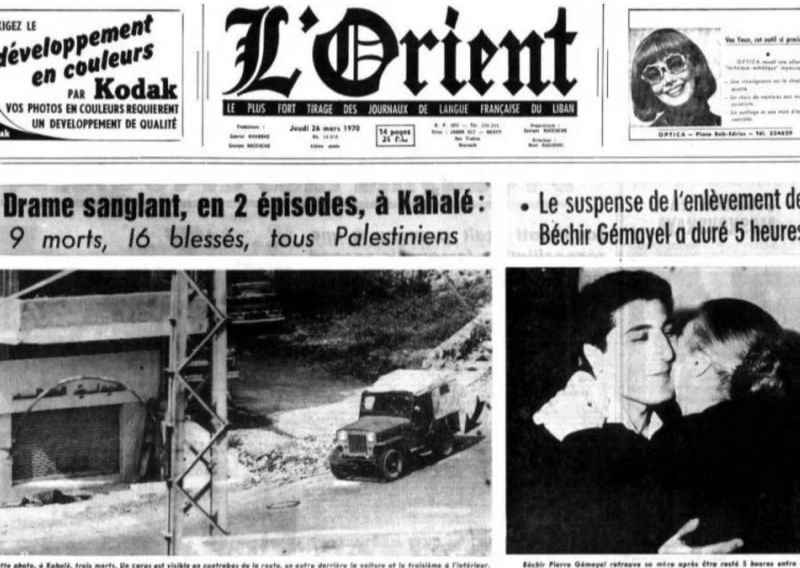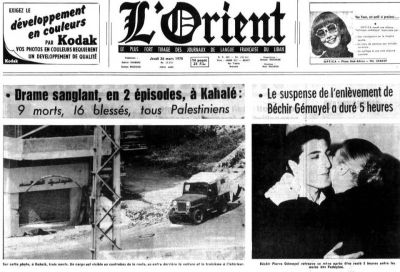
The front page of "L'Orient" the day after the deadly clashes in Kahaleh on March 25, 1970. (Credit: OLJ photo archives)
On Aug. 9, 2023, a Hezbollah truck carrying ammunition overturned on the Kahaleh road bend. Hezbollah members and local residents exchanged fire, leaving two dead — one on each side.
But this was not the first time the Kahaleh road has reared witness to political violence.
Several times in recent history, Kahaleh — a known Christian stronghold in Mount Lebanon — has been the site of conflict between the town's inhabitants and their political opponents.
Three incidents, in particular, were pivotal in shaping this turbulent past.
March 1970
Passing through Kahaleh, a convoy of Palestinian fighters carrying the body of officer Said Ghawache coincided with roadworks, causing a traffic jam.
Fedayeen (Arab guerrilla fighters), armed with machine guns, got out of their cars.
The Palestinian guerrillas made “remarks that were derogatory to the local residents,” according to a L’Orient report from March 26, 1970, that cited bystanders at the scene.
Some Kahaleh residents, who were preparing to attend a funeral procession in their area, also took up arms. In the midst of the traffic jam, they blocked the road.
Things escalated and the two sides exchanged fire in the village square. That day, the Kahaleh bend became a “real battlefield.”
The fighting left two Palestinian fighters dead and 11 wounded.
To prevent further escalation, Kamal Joumblatt — Minister of the Interior at the time — brought together the leaders of the Palestinian resistance organizations and a delegation of Kahaleh residents led by municipal council head Nehmtallah Bejjani.
A degree of common ground was found when the Kahaleh delegation expressed its support for the fedayeen’s military actions against Israel. In turn, the fedayeen expressed their wishes to maintain good relations with the Lebanese and stressed that their weapons were only for fighting the Israeli enemy.
The two parties, accompanied by Joumblatt, decided to reconcile in Kahaleh.
But it was too late. On their way back from the Syrian border, Palestinian militants passed through Kahaleh and, according to witnesses, pointed their machine-gun toward houses. Kahaleh locals perceived this as a threat.
Another gun battle ensued, leaving seven Palestinian militants dead and five wounded.
Bashir Gemayel, then a young student, was present at the scene. He was briefly abducted by the Palestinians.
Taken to the Palestinian camp of Tall al-Zaatar, Gemayel, who would later become president, was released a few hours later upon Joumblatt’s intervention.
During the 1975-90 Civil War, Kahaleh came under military attacks several times. The area was considered the first line of defense for the Baabda Presidential Palace, given its location along the road linking Syria, the Bekaa and Beirut.
March 1976
At the end of March 1976, thousands of allied Palestinian and Lebanese fighters and soldiers from the Arab Lebanese Army (ALA) — a faction that defected from the Lebanese Army in January of the same year — advanced on Kahaleh.
The battle was the first between the Lebanese Army and a splinter group, dissipating all hopes of the ceasefire that had been reported in the local press just days before, according to an analysis by the New York Times.
The same New York Times article elaborated that the assault on Kahaleh, which coincided with the “battle of hotels” in downtown Beirut, helped Palestinian fighters encircle Ashrafieh, a major Christian district.
The seizure of Kahaleh gave Palestinian guerrillas and their allies control of the highway linking Beirut and Damascus.
Kahaleh residents, backed by the Lebanese Army and Christian parties, countered the attack, resulting in the death of hundreds of Palestinian fighters and some 12 individuals from the opposing side.
October 1990
On Oct. 13, 1990, Syrian forces advanced toward the Baabda Palace, where Gen. Michel Aoun, head of a semi-recognized interim military government, had ensconced himself.
Syrian troops marched into areas held by the Lebanese Army, including Kahaleh. The town was seized, and many of the village's fighters and locals were killed.
This article was originally published in French in L'Orient-Le Jour. Translation by Sahar Ghoussoub.
